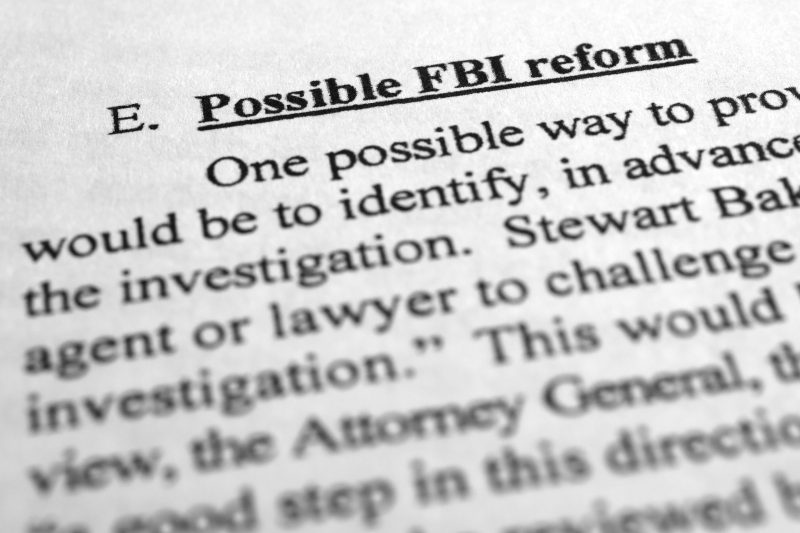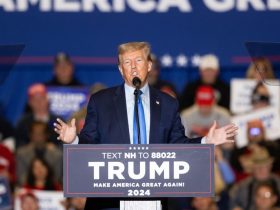Special counsel John Durham published his long-awaited report Monday into how U.S. government agents handled their investigations into possible coordination between Donald Trump’s 2016 presidential campaign and Russian efforts to interfere with the U.S. election.
The probe was initiated in 2019, when Durham — a veteran prosecutor — was first directed by the Trump administration to conduct what was effectively an investigation into an investigation, mired from the beginning in political controversy. While Trump predicted Durham would reveal the “crime of the century,” Democrats largely dismissed the probe as politically motivated.
In the end, Durham’s report criticized the way the FBI relied on raw intelligence in conducting its investigation and made recommendations for how politically sensitive probes could be conducted in the future. Many of his findings echoed a similarly-tasked 2019 report by the Justice Department inspector general, however. In addition, his four-year probe did not send anyone to jail and resulted in a single guilty plea.
Here’s a basic guide to what you need to know.
President Trump’s attorney general, William P. Barr, asked John Durham in 2019 to examine how the FBI and other government agencies investigated possible links between the 2016 Trump campaign and Russia. Durham was appointed as a special counsel in the matter the following year, as the presidential election approached. The special counsel designation is a way for the attorney general to shield an investigation from any perceived or actual conflict of interest.
At the time of his appointment, Durham was the United States Attorney for the District of Connecticut — a respected federal prosecutor experienced in probing corruption among the government’s own ranks, including cases involving the CIA and FBI.
Durham’s task was to find whether any official had broken the law in the course of various investigations into Trump’s possible links with Russia, with a focus on the FBI’s probe — known as Crossfire Hurricane — and the investigation of special counsel Robert S. Mueller III.
Mueller’s 2019 report concluded that Russia interfered in the 2016 presidential election but did not find sufficient evidence to charge any Trump campaign members for taking part in a criminal conspiracy.
Trump had high hopes that Durham would find that agents and officials involved in the investigation broke laws or committed other wrongdoing during the probe.
Durham concluded that bias kept agents from properly examining evidence — leading to “extremely troublesome” failures by the FBI. The report was based on more than 480 interviews and reviews of more than 1 million documents and you can read it in full here.
In particular, Durham accused the FBI of moving too quickly with its investigation of Trump’s 2016 campaign. His report suggested agents relied on uncorroborated evidence when launching their investigation. He also pointed out that agents did not give advance warning of the evidence they had gathered to Trump’ advisers, in contrast to the way they had briefed Hillary Clinton’s aides during her 2016 presidential campaign in advance when they gathered evidence a foreign actor was trying to garner influence with her.
Durham recommended a new position be created at the FBI to help vet and ensure the integrity of politically sensitive investigations.
Not all of Durham’s findings are fresh. Much of the FBI conduct denounced in his report was criticized in a previous 2019 Justice Department report in which Inspector General Michael Horowitz similarly identified “serious performance failures” among FBI agents. Those findings prompted FBI Director Christopher A. Wray to implement changes at the agency.
But Durham went further in his criticism of the FBI than Horowitz did. Whereas Horowitz concluded there was no “documentary or testimonial evidence of intentional misconduct” and found that the FBI had an “authorized purpose” in initiating its investigation into the Trump campaign, Durham’s report said that the FBI’s probe into Kremlin ties had been based on “raw, unanalyzed, and uncorroborated intelligence.”
Durham was tasked with finding violations of the law, and he found few.
Kevin Clinesmith, a former FBI lawyer, was sentenced to one year probation after admitting in a plea deal with Durham to altering a government email used to justify secret surveillance of a former Trump campaign adviser, Carter Page.
Durham’s investigation led to two failed prosecutions — one against private researcher Igor Danchenko and the other against cybsercurity lawyer Michael Sussman. He accused both of lying to the FBI, and both were acquitted in court.
The results contrast sharply with the more than half a dozen guilty pleas or verdicts secured by Mueller’s investigation. The probe also fell short of uncovering the “crime of the century,” as Trump predicted it would, in a 2022 interview with Fox News.
Democrats feared Durham’s probe would not be an evenhanded investigation but a partisan errand conducted on the behalf of an aggrieved president. Some accused Barr of timing the probe to benefit Trump during the 2020 presidential election.
Others have pointed to the high cost of the probe to the taxpayer and questioned whether it was worth it. As of December, the investigation had cost taxpayers more than $6.5 million, according to the Justice Department.
After the release of his report Monday, there was little sign that Durham had garnered the trust of suspicious Democrats. Rep. Jerrold Nadler (D-N.Y.), the ranking member of the House Judiciary Committee, described it as “a political rehashing of what the Justice Department Inspector General already made public in 2019,” and said that nothing in it changed the outcome of the Mueller investigation.
Trump, meanwhile, claimed the report was a victory, posting on social media that it showed “the American Public was scammed.” Florida Gov. Ron DeSantis (R), who is expected to soon launch a 2024 presidential campaign, said late Monday that the report “confirmed what we already knew: weaponized federal agencies manufactured a false conspiracy theory about Trump-Russia collusion.”
In response to Durham’s report, the FBI acknowledged its past failings and pointed to “dozens of corrective actions” it had already put in place. “Had those reforms been in place in 2016, the missteps identified in the report could have been prevented,” it said in a statement Monday.
Devlin Barrett and Perry Stein contributed to this report.








